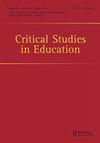高等教育国际化中的学生代理问题
IF 2.7
2区 教育学
Q1 EDUCATION & EDUCATIONAL RESEARCH
引用次数: 0
摘要
本文章由计算机程序翻译,如有差异,请以英文原文为准。
Problematising students’ agency in the internationalisation of higher education
ABSTRACT From a critical ecological linguistic perspective, this paper argues that South Korean English-language-policies are constraining students’ agency. Since the millennium, as a legacy of neoliberalism universities of non-English-first-language contexts have implemented EMI (English-Medium Instruction) courses top-down to further internationalise. Faced with a declining birth rate, South Korea has been no exception to this trend; nevertheless, this ‘dominant policy path’ has disregarded the linguistic challenges of students. These challenges are exacerbated by recent changes made to the English section of the University entrance examination which constrain students’ linguistic capital. Gidden’s Structuration Theory and Bourdieu’s notion of habitus are used to problematise South Korean university students’ agency within their structured-English-learning ecologies. In analysis, I use a constructivist approach enabling a theory of Situated Linguistic Capital to emerge. This theory conceptualises a dynamic between trust and linguistic capital which has been shaped by the past and which affects future affordances. Accounts of English educational experiences, collected from ten South Korean university students, are used to exemplify the theory. I conclude by arguing that conducting a needs analysis with students and EMI content instructors, to understand existing power relations, will encourage moves towards bottom-up, socially just directions in future South Korean English-language-policies. (198)
求助全文
通过发布文献求助,成功后即可免费获取论文全文。
去求助
来源期刊

Critical Studies in Education
EDUCATION & EDUCATIONAL RESEARCH-
CiteScore
10.10
自引率
5.10%
发文量
18
期刊介绍:
Critical Studies in Education is one of the few international journals devoted to a critical sociology of education, although it welcomes submissions with a critical stance that draw on other disciplines (e.g. philosophy, social geography, history) in order to understand ''the social''. Two interests frame the journal’s critical approach to research: (1) who benefits (and who does not) from current and historical social arrangements in education and, (2) from the standpoint of the least advantaged, what can be done about inequitable arrangements. Informed by this approach, articles published in the journal draw on post-structural, feminist, postcolonial and other critical orientations to critique education systems and to identify alternatives for education policy, practice and research.
 求助内容:
求助内容: 应助结果提醒方式:
应助结果提醒方式:


